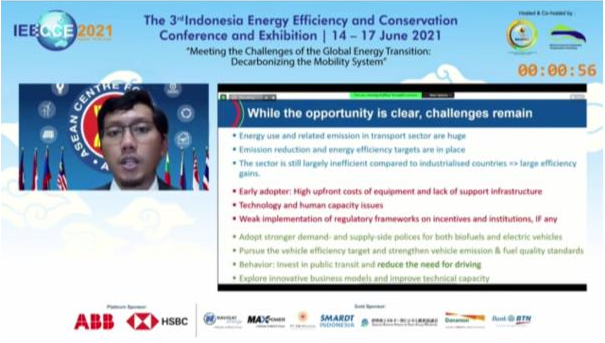
16 June 2021
On June 16th, 2021, ASEAN Centre for Energy (ACE) was invited to participate in one of the sessions in the 3rd Indonesia Energy Conservation and Efficiency Conference & Exhibition (IEECCE). Held virtually on 14-16 June 2021, the event is hosted by the Indonesian Energy Conservation and Efficiency Society (MASKEEI) and The National Center for Sustainable Transportation Technology (NCSST-ITB).
ACE, represented by Dr Zulfikar Yurnaidi, Senior Officer of Renewable Energy and Energy Efficiency (REE) and Senior Research Analyst of ACCEPT, took the role as one of the panellists in INDONESIA SUSTAINABLE MOBILITY SUMMIT – Session 2: The Experts Dialogue (Technology and Best Practices). The three hours session was held on 16 June 2021.
The session was moderated by Prof. Harun Al-Rasyid Lubis, professor at Bandung Institute of Technology (ITB). He provided short opening on the trend of energy transition in the transportation sector of Indonesia, towards both electric mobility and biofuel, and the role of technology and best practices.
The first panellist was Dr Hammam Riza, the Head of Agency for the Assessment and Application of Technology (BPPT). He shared the transportation research activities in BPPT, especially in the biofuel development and other transport-related technologies. He was followed by Dr Sigit P Santosa, the Director of NCSTT-ITB. He introduced NCSTT as research institution focused on sustainable transport technology, along with its key research activities.
The third panellist was Hadi Irawan, GM EPCC of PT Wijaya Karya Tbk(Wika). He shared his company’s profile but focused more on the GESITS, the electric bike developed by Indonesian research ecosystem and manufactured by Wika. The fourth and fifth panellists were Jacob Teter from IEA and Bert Fabian from UN Environment Program (UNEP). Both shared the studies and activities of their institutions that are related to sustainable mobility.
As the sixth panellist, Zulfikar first introduced ACE and its roles and responsibilities as the regional think tank, catalyst, and knowledge hub. He then covered the ASEAN Plan of Action for Energy Cooperation (APAEC) 2015-2025 Phase II 2021-2025, especially the strategies and action plans of related to transportation. The 6th ASEAN Energy Outlook (AEO6) has shown that the transport and industry, would be the largest energy consuming sectors in the region even in 2040. Along with power sectors, they would be key sectors to achieve decarbonisation. Noting the intersectoral nature of transport, he also shared the regional activities of transport sector, including the fuel economy roadmap with focus on light-duty vehicles and the comparison of policies and status on electric mobility and biofuel in the region. Closing his presentation, he summarised the opportunities, challenges, and key strategies of sustainable mobility.
The last panellist was Deni from Mega Project of PT PLN. He addressed the issues of clean energy sources for electricity generation, as the driver of electric mobility in the future. This was followed by the Q&A sessions. ACE noted the importance of regional collaboration and sharing of best practices in the region and opened the collaboration from various institutions in the region. The recording of the event can be found here.
Read more of our articles here.